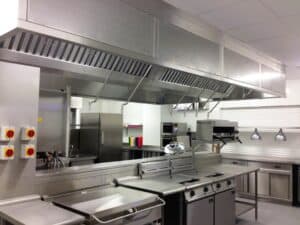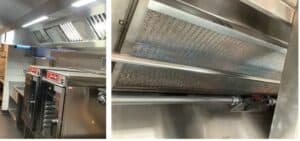Poor indoor air quality can result in higher air temperatures and more pollutants in the air, resulting in costly food wastage and poor staff wellbeing. We discuss how improving air quality and introducing infection prevention measures can result in long term savings.
Food manufacturing guidelines for indoor air quality
Due to the risk of COVID-19 being spread through airborne transmission, food manufacturing guidelines on mechanical ventilation and filtration are tighter than ever.
Across all industries, businesses must ensure there’s an adequate supply of clear air throughout the premises. As many food manufacturers operate in larger spaces such as warehouses, a mechanical ventilation system is essential for providing a steady flow of fresh air.
The guidelines on air handling in the food industry recognise an effective ventilation system as essential. A fully functional system with proper filtration reduces the potential for food contamination, reducing waste and saving costs.
Food manufacturers are responsible for following the food business guidance and ensuring good air quality standards to minimise contamination, as well as ensure safe air for employee wellbeing.
What are the microbiological standards for air quality in food manufacturing?
All food manufacturers are required to separate areas of their facility into different zones. This is so they can control the potential hazards and adhere to microbiological standards.
These areas include non-food production, basic hygiene, medium hygiene and high hygiene. The type of area will influence the air handling system that is required.
While some businesses rely on natural ventilation, food manufacturing should not as it isn’t an effective method for consistent fresh air circulation or infection prevention.
What impact does poor air filtration have on food manufacturers?
Poor air filtration results in increased risks around the safety and hygiene of food handling. Not only does it impact the product, but puts employees at risk of developing short and long term health problems.
Shelf life
With over 100,000 tonnes of food never making it to the checkout each year, what can food manufacturers do to extend shelf life and reduce waste?
Contaminated air can easily move from area to area within a food manufacturing facility. Controlling indoor air quality through filtration is key for reducing exposure to contaminants that result in mould and other spoilage.
By reducing the exposure to contaminants, harmful bacteria has less opportunity to grow, preventing the end result of a spoiled product.
Employee wellbeing
Sick days cost the UK economy up to £92 billion every year. To maximise productivity, employers must take some responsibility for the health of their workforce by proving the safest possible working environment.
When an employee breathes in air polluted with harmful germs for the majority of their day, it’s quite likely that they are going to get sick and have to take time off work. By ensuring air in their work station is circulated and filtered, you’ll have peace of mind that they are safe from harm.
How to reduce indoor air pollution
There are many infection prevention and control solutions available for food manufacturers for reducing indoor air pollution.
Food manufacturers should adopt a robust infection control strategy to ensure a safe environment for both the production process and employees in the building.
Indoor air quality testing
Food manufacturers should undertake air quality measurement, monitoring and auditing.
During the production process, pollutants such as nitrogen oxides, ozone and particulate matter are emitted, which can contaminate food and is harmful for employees to inhale. The quality of indoor air will change continuously, and so continuous monitoring is key.
Ensuring air filtration measures are in place to remove harmful microbes and circulate consistently clean air will see tests provide more positive air quality results. Staying on top of these will allow a consistently safe environment for workers, reducing workplace sickness.
Ventilation maintenance
A well-maintained mechanical ventilation system ensures that air is circulated and filtered to provide the highest standard of air quality.
Most businesses adhere to standard guidelines, having a yearly check and calling for support when an issue occurs. However, it is more cost-efficient to view maintenance as a preventative measure, with regular cleaning and checks to offset more expensive issues further down the line.
Planned preventative maintenance can include duct inspection and filter cleaning to ensure the system is working at maximum efficiency. This can be scheduled to be carried out during downtime to ensure no operational disruptions, preventing a break in productivity.
Carrying out scheduled maintenance is a preferred alternative to fixing when the system is experiencing problems. Unexpected downtime costs a lot more than the system fixes. It has a direct impact on productivity, interrupting regular operations which can be costly not only for the manufacturer but also for its clients.
Air purification technologies
Ultraviolet germicidal irradiation (UVGI) is a proven air purification technology. It uses short-wavelength ultraviolet (UV-C) light to disinfect and kill over 99% of common microbes in the air.
UVGI technology
To ensure ductwork remains clean and air is disinfected as it circulates through air handling units, we provide manufacturers with TechniKlean. The fitting sits within the duct, improving air quality and killing harmful microbes to ensure a safe, clean and controlled environment.
CoilKlean helps to maintain optimum heat transfer and maximise energy efficiency, reducing maintenance costs and limiting the risk of coil damage through manual cleaning.
For Fine Lady Bakeries, we provided an infection control solution that provided a safe working environment and extended product shelf life. If you want to learn more about how Plasma Clean technologies can provide better air quality and infection prevention measures for your facility? Contact us at [email protected] for a free consultation.








